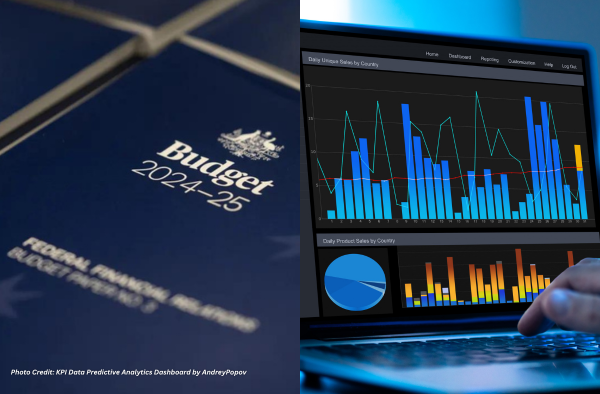Federal budget boosts data capabilities
Share

The Australian Federal Government’s latest budget for 2024–25 illustrates a comprehensive plan to strengthen Australia’s defences against cyber threats and safeguard the data of businesses, government organisations, and individuals. Significant investments in enhancing cybersecurity measures for regulators and registers, expanding Australia’s Digital ID System, and allocating funds for quantum computing are highlighted in the budget. These efforts not only seek to enhance Australia’s cybersecurity but also lay the groundwork for technological breakthroughs such as quantum computing.
Enhancing data management funding
The Australian Federal Budget for the 2024–25 fiscal year showcases a strong dedication to improving data capabilities. The budget allocates significant funding for critical initiatives, with the Digital Transformation Agency (DTA) receiving a notable $500 million allocation. This investment aims to improve digital services and streamline data integration projects. The funding aims to improve data sharing among federal, state, and local governments. This initiative is of utmost importance in promoting a cohesive and streamlined data management system across different tiers of government.
By improving data sharing, the government can make better-informed decisions, improve service delivery, and optimise resource utilisation. The budget includes funding for enhancing the cybersecurity of regulators and registers ($206 million), expanding Australia’s Digital ID System ($288.1 million), and investing in quantum computing ($472 million), in addition to the DTA funding. These efforts not only seek to enhance Australia’s cybersecurity but also lay the groundwork for technological progress such as quantum computing.
Securing data with strategic investments
The Australian Federal Budget for the fiscal year 2024-25 has made substantial commitments to bolstering Cybersecurity and enhancing Data Protection. The budget papers shed light on the main areas of interest:
- Enhancing Cybersecurity of Regulators and Registers: The government has committed to a substantial investment of $206.4 million over the course of four years, starting in 2024–2025, with an additional $7.2 million allocated annually thereafter. This investment seeks to enhance the data capability and cybersecurity of the Australian Prudential Regulation Authority (APRA) and the Australian Securities and Investments Commission (ASIC), while also focusing on the stabilisation of business registers and the modernisation of legacy systems in different departments.
- Australia’s Digital ID System: The government has dedicated $288.1 million over four years to implement its digital ID scheme. This initiative seeks to reduce the amount of personal information that businesses retain, in response to the heightened concerns caused by recent data breaches.
- Investment in Quantum Computing: The federal government and the Queensland state government have established a significant collaboration, leading to a substantial investment of $940 million in PsiQuantum. This US-based quantum computing startup has chosen Brisbane as the location for its headquarters.
These investments indicate the government’s commitment to bolstering cybersecurity, safeguarding data, and fostering technological advancement. The initiatives aim to strengthen Australia’s cybersecurity, improve data protection, and facilitate progress in quantum computing.
Data-driven sector advancements
The Australian Federal Budget for the 2024–25 fiscal year highlighted the notable effects on various sectors of improved data management and analytics capabilities:
- Healthcare: The industry is poised to benefit from enhanced data analytics, leading to improved patient outcomes through personalised treatment plans and more effective resource allocation. Projections indicate that this investment will significantly reduce healthcare expenses, estimated to be around 10% within the next five years.
- Finance: Enhanced data quality and analytics will bring significant advantages to the financial services sector. APRA’s extensive pilot study on data quality predicts that this development will significantly enhance risk management and compliance.
- Education: Improving data systems in education will allow for more precise assessments of student needs and material distribution. This will ultimately enhance educational results and streamline operations.
These specific impacts demonstrate the government’s dedication to leveraging data and analytics to boost various sectors of the economy. The objective is to improve service delivery, achieve better outcomes, and increase efficiency in these sectors.
Government boosts industry partnerships
The Australian Federal Budget for the financial year 2024–25 emphasised notable partnerships between the government and the private sector. The budget promotes a cooperative approach between government agencies and the private sector to harness their expertise and foster innovation in data management. Public-private partnerships are anticipated to have a vital role in the implementation of these initiatives, guaranteeing the adoption of cutting-edge technologies and optimal practices. The budget also outlines initiatives aimed at revolutionising the Australian industry, science, and resource sectors.
The government’s vision for the future of Australia focuses on stimulating investment, generating employment, and capitalising on the changing global economy. This involves capitalising on the possibilities presented by the shift towards achieving zero emissions, harnessing the potential of innovative technologies, and fostering the development of globally competitive industries and fresh avenues for economic expansion. The Future Made in Australia National Interest Framework has identified sectors as crucial for economic resilience and national security, and the government is supporting these sectors.
Efforts are underway to develop and execute projects related to batteries, clean energy manufacturing, green metals, and critical minerals in a strong partnership with the government. These collaborations highlight the government’s dedication to utilising public-private partnerships to drive advancements in key sectors of the economy. They are poised to improve service delivery, optimise outcomes, and streamline operations in these industries.
The Australian Federal Budget for 2024–25 highlights the government’s proactive approach to enhancing data management and analytics capabilities in different sectors. This proactive approach not only strengthens cybersecurity measures but also paves the way for state-of-the-art technological advancements, such as quantum computing. As these initiatives continue to develop, they have the potential to greatly transform Australia’s data landscape, bringing about improved security and efficiency.
The government’s investment in these areas highlights its dedication to utilising technology to stimulate growth and foster innovation. In the future, the impact of these initiatives will have wide-ranging outcomes. They indicate a transition to a data-driven economy, where making informed decisions based on strong data management and analytics becomes the standard. This has the potential to open up new opportunities, drive economic growth, and establish Australia as a global leader in data management and analytics.

Justin Lavadia is a content producer and editor at Public Spectrum with a diverse writing background spanning various niches and formats. With a wealth of experience, he brings clarity and concise communication to digital content. His expertise lies in crafting engaging content and delivering impactful narratives that resonate with readers.










Today’s Pick
11th Annual Aus Goverment Data Summit
April 1, 2025
7th Annual NZ Government Data Summit
May 7, 2025
3rd Public Sector Comms Week
May 14, 2025
Subscribe
We send emails,
but we do not spam
Join our mailing list to be on the front lines of healthcare , get exclusive content, and promos.
AI appointment Australia Australian boost boosts business businesses covid-19 cyber attack cybersecurity cyber security data data breach data management defence Digital employment enhance enhances fraud funding governance government grants Healthcare infrastructure Innovation Lockdown management new zealand NSW NZ online privacy public Public Sector queensland renewable energy scams security Social Media Technology telecommunications victoria
-

Understanding and building your digital strategy
Digital Government, Opinion
-

Featured Leader: Jamie Morse on multi-channel strategies for communication
Communications, Featured Leader
-

Featured Leader: Tegan Tembe of NSW Treasury on creating solid planning strategies and processes
Featured Leader
-

Wirraka Maya Health Service improves patient care with My Health Record
Learning
Show More-

Effects of ineffective communication in the workplace
Communications, Personal Development
-

7 ways you can enhance your personal development skills
News, Personal Development
-

5 advantages of working in the public sector
News, Personal Development, Professional Development
-

7 causes of communication issues in the workplace
Communications, News, Personal Development
Show MoreLast Viewed